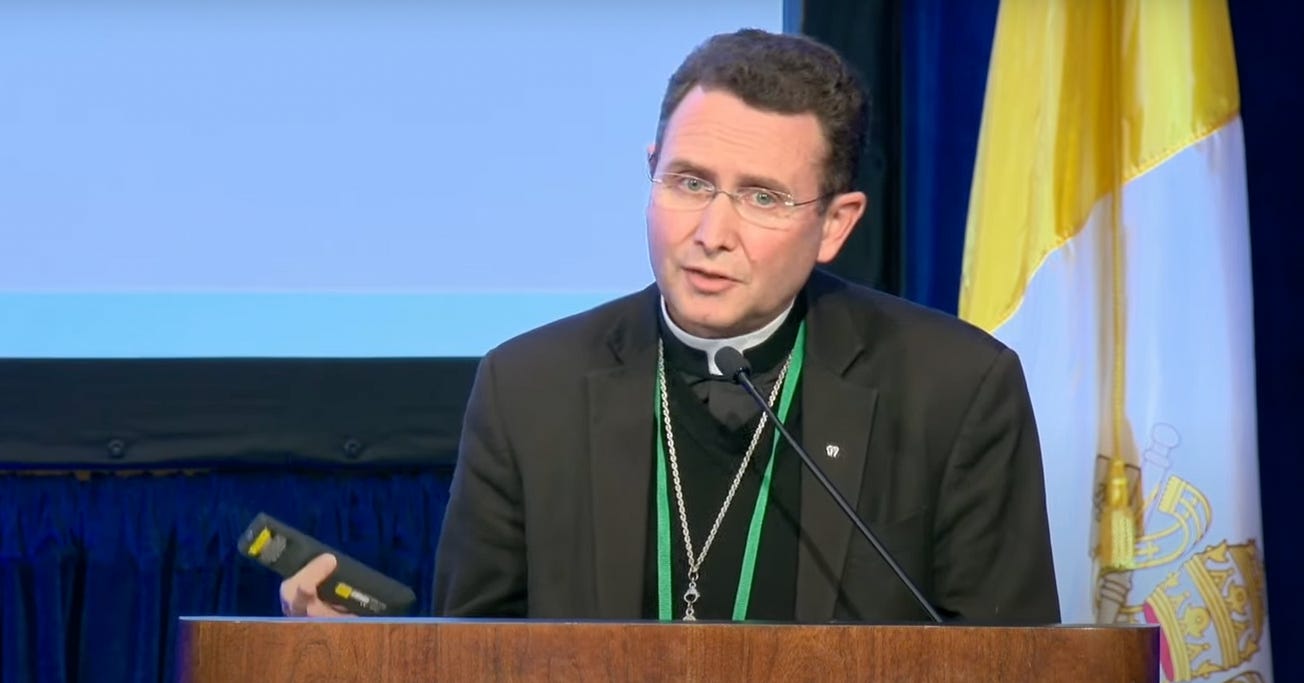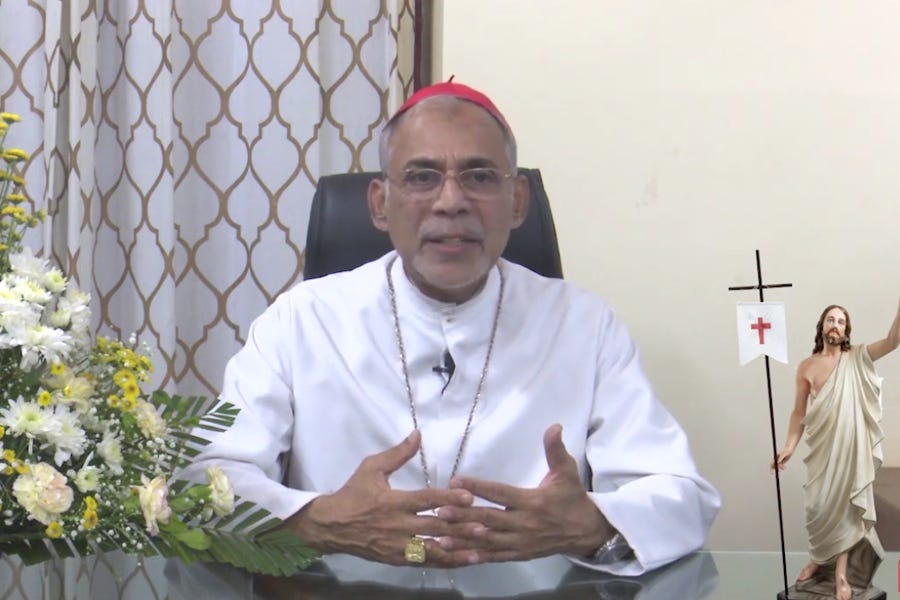Hey everybody-
By my count, today is the last day of the first half of Lent, and tomorrow is Lent’s midpoint. That makes these days a good time to recommit to any already forgotten Lenten intentions, or to think about deepening practices of prayer, fasting, and almsgiving as we get closer to Holy Week.
News updates
If you live in the U.S., you’ve probably at least heard of QAnon, a set of conspiracy theories which hold that Donald Trump is part of a resistance movement against an international network of powerful evildoers, and that he will soon reclaim the presidency to vanquish them.
In the past few months, I’ve heard from priests who say those theories have gained ground among their parishioners, and I’ve heard from a lot of people who say those theories have changed relationships within their families. So I’m grateful that freelance journalist Mary Farrow reported at The Pillar on the QAnon phenomenon, how it has affected some Catholic families, and how experts suggest engaging with someone in your family, or in your parish, who has embraced the Q.
—
How do solve a problem like Sabina’s?
Cardinal Blase Cupich is probably asking himself that these days. Here’s why:
Last week, parishioners at St. Sabina Parish, a well-known socially and politically active parish in Chicago’s South Side, announced plans to withhold money owed to the Chicago archdiocese, because their pastor, Fr. Michael Pfleger, is accused of serially sexually abusing teenage boys in the 1970s, and parishioners say the process Pfleger faces is being mishandled by the archdiocese. Withholding the diocesan tax is a serious escalation of the tensions between archdiocese and parish, which began when the Pfleger allegations were first made in January.
Here’s what’s interesting: Ten years ago, in April 2011, Pfleger found himself in something of a stand-off with the late Cardinal Francis George. The cardinal wanted to transfer the priest, and Pfleger didn’t want to leave. He went so far as to say on the radio that he’d consider leaving the Catholic Church before leaving his parish — a comment he later walked back, but not before securing his continued tenure at St. Sabina.
—
When coronavirus vaccines were first distributed in the U.S., public health officials expressed concern about much higher rates of “vaccine hesitation” than they’d initially projected. New polling shows those rates are dropping — As more people know someone who has been vaccinated, fewer people say they are against being vaccinated themselves.
More than 75% of U.S. Catholics say they plan to get vaccinated, or have been already.
But even while Pope Francis and Pope emeritus Benedict XVI have been vaccinated, and while the Holy See and the USCCB have both spoken on the subject, there is still debate in some Catholic circles about the vaccines, and some Catholics have found a platform to denounce them as immoral.
Ed and I looked yesterday at a few reasons why the Church’s message on the vaccine seems not to be landing. We identified three reasons: that the nuance of the moral argument has been lost in the media, that some diocesan statements are poorly written or confusing, and that some Catholics with positions outside the mainstream have had an outsized influence on the conversation.
There is another reason we wanted to write about, but it didn’t quite fit into our analysis, so we put it aside. I think it’s worth considering here, because it points to some broader issues facing the Church’s leaders.
The Catholic conversation about the vaccine is a conversation about abortion. Vaccines, like many other medications and even many processed foods, are developed and tested using long-replicated cell lines initially derived from the bodies of aborted children. Many Catholics skeptical about getting vaccines are concerned about having some degree of moral complicity in the abortion of those children. And when bishops say the cooperation with abortion involved in getting the vaccine is so remote as to be overcome by other goods, those Catholics don’t believe them.
Why not?
Well, partly because many of those Catholics don’t believe that the bishops’ conference, or their own bishops, are serious about the grave moral evil of abortion.
To some, that’s baffling. After all, there are bishops who pray weekly outside abortion clinics, bishops who fund crisis pregnancy centers, bishops who say that ending legal protection for abortion is the “preeminent priority” of Catholic political activity. And — for those reasons and others — there is even a group of Catholics who charge that the U.S. bishops focus excessively on abortion.
Still, some Catholics see a counter-witness that has left them distrustful. They believe bishops decline to engage with Catholic politicians on abortion, or seem to downplay the gravity of the practice in favor of finding “common ground,” or have discouraged prayer outside of abortion clinics, or make false equivalencies between abortion and other moral issues. Those things leave some Catholics skeptical about the veracity and integrity of their bishops’ stance on abortion-related issues, including the vaccine.
That’s not the only issue. Most Catholics skeptical of the CDF’s position on the vaccine are influenced by other factors as well. But the impact of perceived ambiguity from bishops on abortion is a real factor, because for some Catholics, it has contributed to a broad lack of trust.
The vacuum of trust is filled by an entire industry of voices competing with the bishops for Catholic moral authority — not authority ex cathedra, but authority in the marketplace of ideas. (Here I am talking mostly about figures, some of dubious credibility, who relentlessly challenge the teaching authority of bishops. Some of them might best be described as grifters).
The vast majority of U.S. bishops want to prioritize opposition to legal protection for abortion, and at the same time prioritize providing assistance to families and women in need. But a small and vocal cadre of bishops has argued that prioritizing abortion among social issues is somehow disloyal to Pope Francis, or a distortion of Catholic theology. A larger cadre has spoken out to say directly that they will not address — not with sacramental discipline, anyway — the scandal of pro-abortion Catholic political figures. That crop of voices has sown distrust among many practicing and pro-life Catholics.
At least one effect of all that? Catholics who don’t trust their bishops’ guidance on vaccines.
Hosea 8:7 comes to mind.
Links you might enjoy
I miss traveling, and I like taking the train. In the western part of the country, taking Amtrak is a weird experience: Because freight trains have track priority over passenger trains, Amtrak schedules are notoriously unpredictable, train delays of 10+ hours are not uncommon, and trains, which are cheap, are filled with a fascinating cross-section of humanity.
I used to travel a lot between Colorado and Nebraska, and even while the unpredictability probably frustrated people I’d schedule meetings with, I mostly took Amtrak.
A few years ago, a filmmaker in Norway stuck a camera to the front of a train traveling from Bergen to Oslo, and just pressed record before the journey got underway. He filmed every minute of the trip, more than seven hours, and then he convinced the Norwegian state television network to air the entire thing, uninterrupted, with no cuts, no voice-overs, no music.
Norwegians loved it. Millions tuned in.
In fact, the trip spawned a new genre in Norwegian television: slow TV. Norwegians have since watched long boat rides and a several other “slow TV” specials, which have become national events.
The train thing is seven hours long. Parts of it are stunningly beautiful. The tunnels are pretty boring - the train just ambles on through the darkness. I’ve found it enjoyable to listen to while reading or working - the sound of the train is good background, and one can periodically look up from one’s work to take in some of the most beautiful parts of Norway, or sometimes a few miles of an unlit tunnel.
When first I put on the Norwegian film, I made the mistake of telling my kids we were going to watch a “train movie.” They thought this meant we’d watch a movie in which we could see a train, not a movie in which the train is behind the camera. They were not pleased. So I let them watch “Arrival of a Train at La Ciotat,” which, in 1896, was one of the first films to be shown publicly.
Accounts from the first screening of “Arrival of a Train at La Ciotat” say that the audience, most of whom had never seen a film before, were terrified by the prospect of a locomotive steaming toward them, and some ran in panic toward the back of the theater. My children, apparently more savvy than nineteenth-century Parisians, were wholly unimpressed.
If you’re thinking about how best to meditate upon the Lord’s passion during your daily tasks this Lent, might I suggest this short poem, which Joyce Kilmer wrote a few months before he was killed toward the end of the First World War?
Kilmer, by the way, is a terribly underappreciated American Catholic poet. He is unfortunately remembered for “Trees,” a simple and often lampooned poem that does not represent its author’s oeuvre. Kilmer should be remembered as a budding Romantic, killed before he peaked, with a deeply Catholic vision and something to say.
Finally, after the pope’s historic and beautiful visit to Iraq these last few days, join me in a prayer of thanksgiving for the faith and witness of Iraqi Christians, who faced the extraordinary persecution of ISIS and are now rebuilding lives, some of them in Iraq, some in other countries, and some we have been blessed to welcome in the United States. May we welcome more, and grow in Christian unity with them.
Please be assured of our prayers, and please pray for us.
Yours in Christ,
JD Flynn
editor-in-chief
The Pillar





